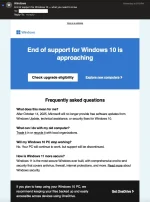Microsoft has started sending emails to Windows 10 users about support ending on October 14, 2025. They want users to run a simple test to see if their computers can handle Windows 11. The email explains two main paths forward. First, check if your current machine has the necessary hardware, like TPM 2.0 and an approved processor. Second, if your computer fails this test, Microsoft suggests you should consider buying a new PC. They say these changes will boost security and help systems meet newer technical requirements. The message also mentions you can recycle your old computer through local groups if it cannot be upgraded.
Many computers run Windows 10 perfectly fine but lack the specific hardware pieces needed for Windows 11. Users point out that missing these requirements doesn't mean your computer performs badly. People worry about spending money on new machines when their current computers work just fine for their needs. The upgrade push seems unnecessary to many users who see their systems handling daily tasks without any problems.
Some tech-savvy users have started exploring Linux as an alternative operating system. Linux might offer stable performance without forcing users to buy expensive new hardware. Another option lets users force Windows 11 onto computers that Microsoft says aren't supported. This method carries risks because Microsoft doesn't promise everything will work correctly after such an installation.
The situation creates a tough decision for Windows 10 users. They must choose between trying different operating systems, purchasing new hardware, or sticking with Windows 10 after it stops receiving security updates next year. The strict hardware requirements affect millions of computers worldwide that can't run Windows 11 officially. Users feel stuck between keeping their functional but aging machines and buying expensive new equipment for essentially the same Windows experience.
Many computers run Windows 10 perfectly fine but lack the specific hardware pieces needed for Windows 11. Users point out that missing these requirements doesn't mean your computer performs badly. People worry about spending money on new machines when their current computers work just fine for their needs. The upgrade push seems unnecessary to many users who see their systems handling daily tasks without any problems.
Some tech-savvy users have started exploring Linux as an alternative operating system. Linux might offer stable performance without forcing users to buy expensive new hardware. Another option lets users force Windows 11 onto computers that Microsoft says aren't supported. This method carries risks because Microsoft doesn't promise everything will work correctly after such an installation.
The situation creates a tough decision for Windows 10 users. They must choose between trying different operating systems, purchasing new hardware, or sticking with Windows 10 after it stops receiving security updates next year. The strict hardware requirements affect millions of computers worldwide that can't run Windows 11 officially. Users feel stuck between keeping their functional but aging machines and buying expensive new equipment for essentially the same Windows experience.












